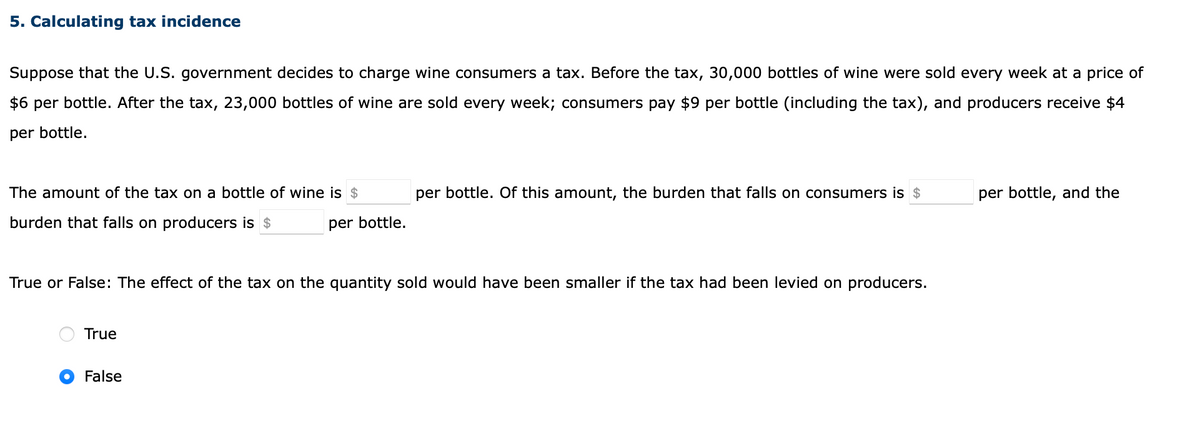5. Calculating tax incidence Suppose that the U.S. government decides to charge wine consumers a tax. Before the tax, 30,000 bottles of wine were sold every week at a price of $6 per bottle. After the tax, 23,000 bottles of wine are sold every week; consumers pay $9 per bottle (including the tax), and producers receive $4 per bottle. The amount of the tax on a bottle of wine is $ per bottle. Of this amount, the burden that falls on consumers is $ per bottle, and the burden that falls on producers is $ per bottle. True or False: The effect of the tax on the quantity sold would have been smaller if the tax had been levied on producers. True False
5. Calculating tax incidence Suppose that the U.S. government decides to charge wine consumers a tax. Before the tax, 30,000 bottles of wine were sold every week at a price of $6 per bottle. After the tax, 23,000 bottles of wine are sold every week; consumers pay $9 per bottle (including the tax), and producers receive $4 per bottle. The amount of the tax on a bottle of wine is $ per bottle. Of this amount, the burden that falls on consumers is $ per bottle, and the burden that falls on producers is $ per bottle. True or False: The effect of the tax on the quantity sold would have been smaller if the tax had been levied on producers. True False
Principles of Microeconomics
7th Edition
ISBN:9781305156050
Author:N. Gregory Mankiw
Publisher:N. Gregory Mankiw
Chapter6: Supply, Demand And Government Policies
Section: Chapter Questions
Problem 5QR
Related questions
Question
would you please help me with this homework? thank you.

Transcribed Image Text:5. Calculating tax incidence
Suppose that the U.S. government decides to charge wine consumers a tax. Before the tax, 30,000 bottles of wine were sold every week at a price of
$6 per bottle. After the tax, 23,000 bottles of wine are sold every week; consumers pay $9 per bottle (including the tax), and producers receive $4
per bottle.
The amount of the tax on a bottle of wine is $
per bottle. Of this amount, the burden that falls on consumers is $
per bottle, and the
burden that falls on producers is $
per bottle.
True or False: The effect of the tax on the quantity sold would have been smaller if the tax had been levied on producers.
True
False
Expert Solution
This question has been solved!
Explore an expertly crafted, step-by-step solution for a thorough understanding of key concepts.
This is a popular solution!
Trending now
This is a popular solution!
Step by step
Solved in 3 steps

Knowledge Booster
Learn more about
Need a deep-dive on the concept behind this application? Look no further. Learn more about this topic, economics and related others by exploring similar questions and additional content below.Recommended textbooks for you

Principles of Microeconomics
Economics
ISBN:
9781305156050
Author:
N. Gregory Mankiw
Publisher:
Cengage Learning

Principles of Macroeconomics (MindTap Course List)
Economics
ISBN:
9781305971509
Author:
N. Gregory Mankiw
Publisher:
Cengage Learning

Principles of Economics, 7th Edition (MindTap Cou…
Economics
ISBN:
9781285165875
Author:
N. Gregory Mankiw
Publisher:
Cengage Learning

Principles of Microeconomics
Economics
ISBN:
9781305156050
Author:
N. Gregory Mankiw
Publisher:
Cengage Learning

Principles of Macroeconomics (MindTap Course List)
Economics
ISBN:
9781305971509
Author:
N. Gregory Mankiw
Publisher:
Cengage Learning

Principles of Economics, 7th Edition (MindTap Cou…
Economics
ISBN:
9781285165875
Author:
N. Gregory Mankiw
Publisher:
Cengage Learning

Principles of Macroeconomics (MindTap Course List)
Economics
ISBN:
9781285165912
Author:
N. Gregory Mankiw
Publisher:
Cengage Learning

Essentials of Economics (MindTap Course List)
Economics
ISBN:
9781337091992
Author:
N. Gregory Mankiw
Publisher:
Cengage Learning

Principles of Economics (MindTap Course List)
Economics
ISBN:
9781305585126
Author:
N. Gregory Mankiw
Publisher:
Cengage Learning